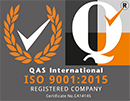Over the past few years, stone table tops have become more fashionable and commonly specified for the contract market. There are many types of stone that can be manufactured into table tops, each with their own unique properties, suitable for different environments. When choosing a table top, it is important to evaluate the all-round performance of a material – considering aesthetics, durability, size, shape, heat, stain, abrasion and scratch resistance.
Stone shows a high performance across all of these listed areas; below we will explore the different types of stones available and their properties.
Marble
Marble is a metamorphic recrystallized limestone that can be supplied in an incredible array of colours and patterns to suit any environment. Marble is a natural material that takes millions of years to form and there are no two slabs of marble that have exactly the same pattern, making it very unique. One of the main materials in marble is calcium and it’s a reaction with this and the acid in things we consume (such as wines, citrus juices, colas, lemonades, vinegar’s and vinegar based sauces) that can cause etching – this is a slight matting of the polish of the stone and can be seen as a ring from where a wine glass has been.
It is also recommended to use mats/coasters to protect the marble from hot pots as it forces the condensation trapped underneath into the marble. Sealants can be applied to help prevent staining by clogging the pores of the stone. This helps to prevent the marble from absorbing liquids and stop colours from penetrating by extending the period of time to clean up a spillage.



Granite
Granites are over 2900 million years old and are made up of volcanic magma, making them the most bombproof choice of natural stone. It is a very dense material which weighs about 10% more than marble for the same size and thickness.
Granites do not contain calcium, therefore will not etch and have a very low porosity making them highly resistant to staining.
There are some very interesting granites on the darker end of the spectrum that are a great alternative to black marbles to avoid issues with etching. Granites are inert enough to resist general weathering, therefor suitable for outdoor usage.



Manufactured Quartz
Manufactured quartz is a popular imitation of marble, with a performance very similar to granite. It is made using waste Quartz and Quartize which is the second most prolific mineral of this planet. This makes the quartz a dense material that is non-porous, and therefore more resistant to chipping, scratching and bacteria.
Etching does not occur in quartz as there is no calcium content and the tops do not require sealant due to their low porosity. However, it is recommended to use mats/coasters to protect tops from hot pots as liquid can become trapped under the base and potentially cause marking (especially with lighter colours).
Manufactured quartz is not recommended for outdoor use as the stone may discolour as the UV light reacts with the resin and yellows it slightly.



Terrazzo
Terazzo is becoming more fashionable across the market and offers a visually exciting and innovative table top option for modern environments.
These stones use marble waste, making them a sustainable choice that is ground down to graded sized chippings for Terrazzo. A cement or resin mixture is then used to hold the product together.
Terrazzo has the same behavioral characteristics as marble as a result of the chippings and therefore is prone to etching. Surfaces will need to be cleaned immediately or protected with mats/coasters, however with the bright colours and busyness of the terrazzo, any marks are likely to go unnoticed.



Our stone table tops are available in circular, square, rectangular and ellipse shapes and in a variety of different sizes. There are also 5 standard edge profiles for both traditional and contemporary looks.

For more information about the stone table tops or to request a quotation, please contact us on +44 (0)20 8591 6770 or email [email protected].



